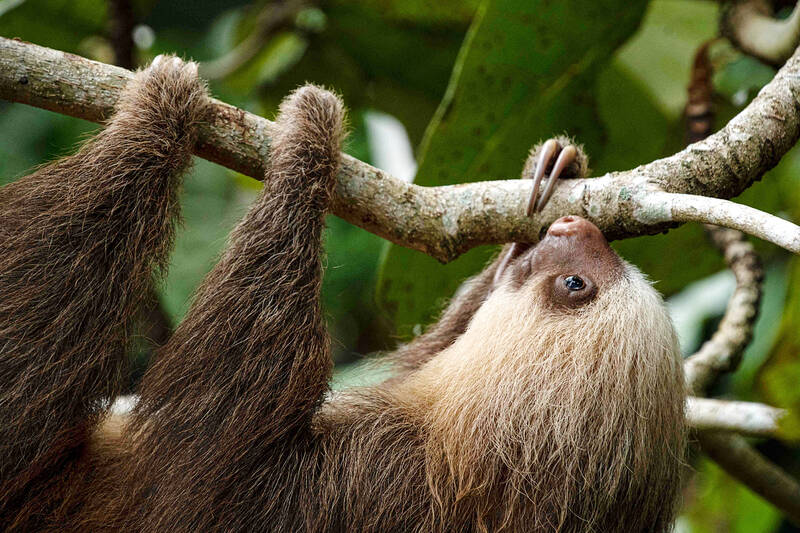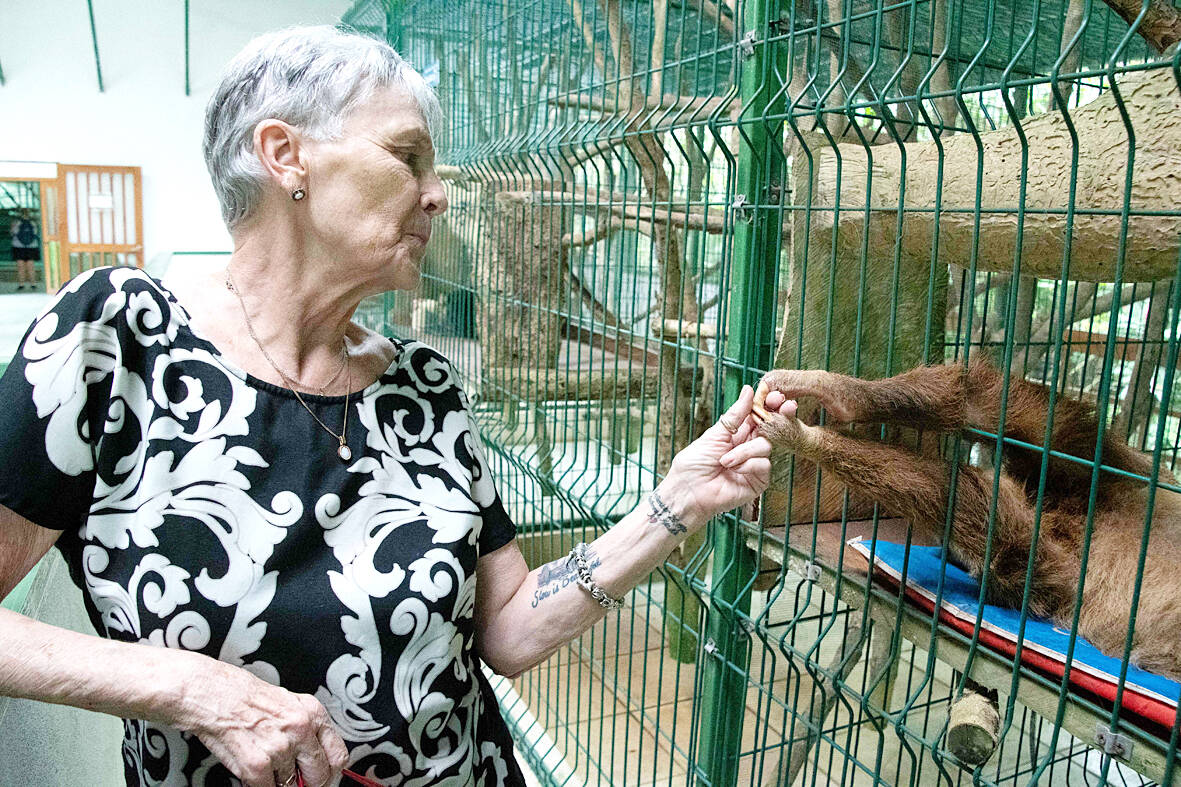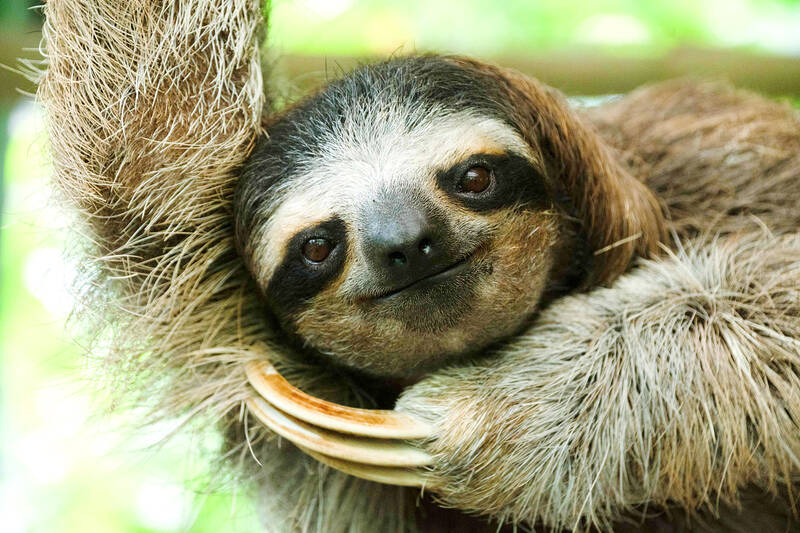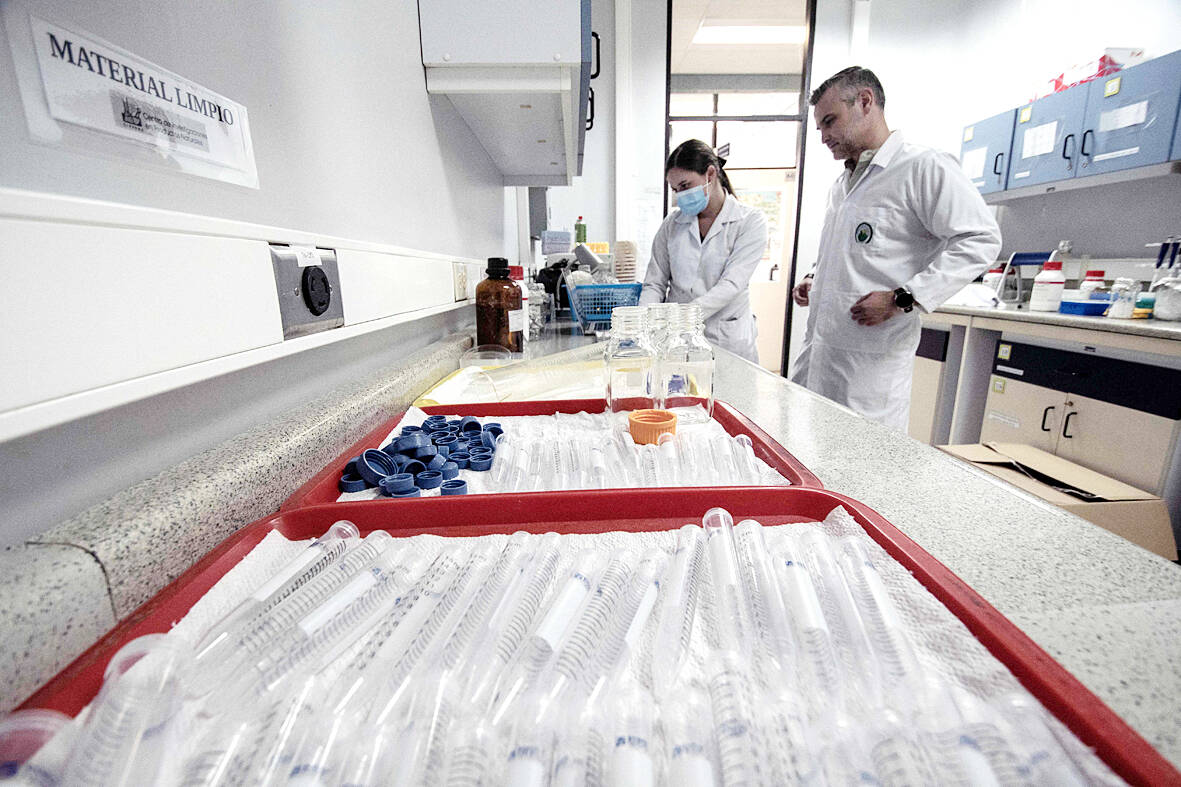The fur of Costa Rican sloths appears to harbor antibiotic-producing bacteria that scientists hope may hold a solution to the growing problem of “superbugs” resistant to humanity’s dwindling arsenal of drugs.
Sloth fur, research has found, hosts bustling communities of insects, algae, fungi and bacteria among other microbes, some of which could pose disease risk.
Yet, experts say, the famously slow-moving mammals appear to be surprisingly infection-proof.

Photo: AFP
“If you look at the sloth’s fur, you see movement: you see moths, you see different types of insects ... a very extensive habitat,” Max Chavarria, a researcher at the University of Costa Rica, said.
“Obviously when there is co-existence of many types of organisms, there must also be systems that control them,” he added.
Chavarria and a team took fur samples from Costa Rican two and three-toed sloths to examine what that control system could be.

Photo: AFP
They found the possible existence of antibiotic-producing bacteria that “makes it possible to control the proliferation of potentially pathogenic bacteria ... or inhibit other competitors” such as fungi, according to a study published in the journal Environmental Microbiology.
NO INFECTION
The sloth is a national symbol in laid back Costa Rica and a major tourist attraction for the Central American country.

Photo: AFP
Both the two-toed (Choloepus Hoffmanni) and three-toed (Bradypus variegatus) sloth species have seen their populations decline, according to the International Union for the Conservation of Nature’s Red List of Threatened Species. They live in the canopies of trees in the jungle on the Caribbean coast, where the climate is hot and humid.
American Judy Avey runs a sanctuary in the balmy jungle to care for sloths injured after coming into contact with humans or other animals.
She treats and rehabilitates the creatures releasing them back into the wild.

Photo: AFP
“We’ve never received a sloth that has been sick, that has a disease or has an illness,” she said.
“We’ve received sloths that had been burned by power lines and their entire arm is just destroyed ... and there’s no infection. “I think maybe in the 30 years (we’ve been open), we’ve seen five animals that have come in with an infected injury. So that tells us there’s something going on in their ... bodily ecosystem.”
Avey, who established the sanctuary with her late Costa Rican husband, Luis Arroyo, had never even heard of a sloth back home in Alaska.
But since receiving her first sloth in 1992, whom she named Buttercup, she has cared for around 1,000 animals.
PENICILLIN INSPIRATION
Researcher Chavarria took fur samples taken from sloths at the sanctuary to examine in his laboratory.
He began his research in 2020, and has already pinpointed 20 “candidate” microorganisms waiting to be named.
But he said there is a long road ahead in determining whether the sloth compounds could be useful to humans.
“Before thinking about an application in human health, it’s important to first understand ... what type of molecules are involved,” said Chavarria.
An example of this is penicillin, discovered in 1928 by British scientist Alexander Fleming, who discovered that a fungal contamination of a laboratory culture appeared to kill a disease-causing bacteria.
His discovery of the world’s first bacteria-killer, or antibiotic, earned him the 1945 Nobel Prize in medicine.
However, microbial resistance to antibiotics has been a growing problem, meaning some medicines no longer work to fight the infections they were designed to treat.
Antimicrobial resistance is a natural phenomenon, but the overuse and misuse of antibiotics in humans, animals and plants has made the problem worse. The World Health Organization estimates that by 2050, resistance to antibiotics could cause 10 million deaths a year.
“Projects like ours can contribute to finding ... new molecules that can, in the medium or long term, be used in this battle against antibiotic resistance,” Chavarria said.

The Democratic Progressive Party (DPP), Chinese Nationalist Party (KMT), and the country’s other political groups dare not offend religious groups, says Chen Lih-ming (陳立民), founder of the Taiwan Anti-Religion Alliance (台灣反宗教者聯盟). “It’s the same in other democracies, of course, but because political struggles in Taiwan are extraordinarily fierce, you’ll see candidates visiting several temples each day ahead of elections. That adds impetus to religion here,” says the retired college lecturer. In Japan’s most recent election, the Liberal Democratic Party lost many votes because of its ties to the Unification Church (“the Moonies”). Chen contrasts the progress made by anti-religion movements in

Taiwan doesn’t have a lot of railways, but its network has plenty of history. The government-owned entity that last year became the Taiwan Railway Corp (TRC) has been operating trains since 1891. During the 1895-1945 period of Japanese rule, the colonial government made huge investments in rail infrastructure. The northern port city of Keelung was connected to Kaohsiung in the south. New lines appeared in Pingtung, Yilan and the Hualien-Taitung region. Railway enthusiasts exploring Taiwan will find plenty to amuse themselves. Taipei will soon gain its second rail-themed museum. Elsewhere there’s a number of endearing branch lines and rolling-stock collections, some

Last week the State Department made several small changes to its Web information on Taiwan. First, it removed a statement saying that the US “does not support Taiwan independence.” The current statement now reads: “We oppose any unilateral changes to the status quo from either side. We expect cross-strait differences to be resolved by peaceful means, free from coercion, in a manner acceptable to the people on both sides of the Strait.” In 2022 the administration of Joe Biden also removed that verbiage, but after a month of pressure from the People’s Republic of China (PRC), reinstated it. The American

This was not supposed to be an election year. The local media is billing it as the “2025 great recall era” (2025大罷免時代) or the “2025 great recall wave” (2025大罷免潮), with many now just shortening it to “great recall.” As of this writing the number of campaigns that have submitted the requisite one percent of eligible voters signatures in legislative districts is 51 — 35 targeting Chinese Nationalist Party (KMT) caucus lawmakers and 16 targeting Democratic Progressive Party (DPP) lawmakers. The pan-green side has more as they started earlier. Many recall campaigns are billing themselves as “Winter Bluebirds” after the “Bluebird Action”